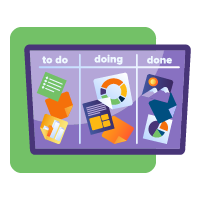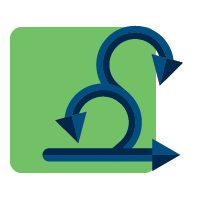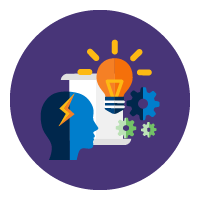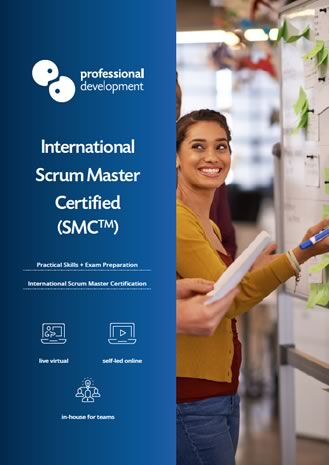What does a Scrum Master do?
Published, January 26, 2022What does a scrum master do all day? What does this role and its responsibilities encompass?
By now, many of us are familiar with scrum project management and recognise this is an important role within any scrum project.
In this article, we look at the role and responsibilities of a scrum master in detail.
This is a helpful guide for anyone thinking about becoming a scrum master or about moving into agile / scrum projects in general.
Download a Scrum Master PDF
Get more detail on the scrum master role instantly by downloading our PDF brochure.
This brochure includes key information from this article, plus guidance on how you can get scrum master certified.
Get PDF BrochureCovered in this Article
Understanding the Scrum Master Role
Scrum masters are often referred to as “facilitators”, “servant leaders”, and “coaches”.
In very simple terms, they support the scrum team and keep everything in the sprint (scrum project cycle) progressing as it should.

While others on the team zoom in on specific tasks, scrum masters remain focused on the bigger picture.
They are dedicated to the progress of the sprint and achieving its goals while supporting the wellbeing and sustainability of the team’s productivity.
6 Scrum Master Responsibilities
It’s important to note that the dynamic and requirements of each team will differ. Therefore, scrum master responsibilities vary from team to team.
There are, however, some elements of the role consistent throughout almost every team. Here, we look at 6 responsibilities that almost always rest with the scrum master.

1. Creating the Right Environment
A good scrum master creates a working environment that supports optimum productivity throughout the cycle of a sprint.
They do this by:
- shielding the team from unnecessary interruptions
- removing any obstacles to productivity that crop up
- ensuring the physical elements of the environment are suitable

2. Coaching and Mentoring
As an important part of the “servant leader” element of this role, scrum masters function as mentors to other members of the team.
Their thorough knowledge of best practices and focus on the overall progression of the sprint enables them to support team members in finding solutions and smart approaches to their work.
They will also coach other team members in managing their time and task list most effectively, in order to avoid burnout.

3. Running Scrum Events
Within any scrum project, there are many different events, such as daily stand-up, sprint reviews, and planning meetings.
Usually, the scrum master is responsible for running these meetings. They schedule the events and organise attendance.
Most importantly, they keep the meeting on track and on time, avoiding unneccessary topic tangents.

4. Communication and Collaboration
Clear and frequent communication is at the heart of any successful scrum initiative.
This refers, not only to communication within the team, but also with external stakeholders such as the customer, other teams, organisational leadership, and suppliers (where relevant).
The scrum master facilitates fluid communication and cross-functional collaboration between the team and all other parties.
They also focus on nurturing an easy, synergetic style of communication within the team.

5. Working with the Product Owner
The scrum master works closely with the scrum product owner – another key role within the team.
Together, they maintain the product backlog, an important list of prioritised project requirements.
As the sprint progresses and the deliverables evolve, the scrum master and product owner refine the priorities on a regular basis.

6. Upholding the Values and Practices of Scrum
Much of this role relies on a commitment to upholding scrum’s values and best-practice application throughout the sprint.
Scrum masters are champions of upholding scrum values at all times.
They advise and teach others within the team on the correct application of scrum values to their work.
You don’t have to be an expert to become a Scrum Master
If you are interested in becoming a scrum master, don’t let the responsibilities deter you.
Through training, you will gain the tools and knowledge you need to understand scrum and execute the tasks above with confidence.
What is not the responsibility of the scrum master?
As you can see, the scrum master role is a busy one! They have many varied responsibilities that touch on almost every aspect of the project.
Don't feel overwhelmed; they are not responsible for everything. Scrum masters are not primarily responsible for:
- stakeholder management
- creating the project deliverables
Typically, these tasks fall to the product owner and scrum team respectively. In smaller teams, the scrum master may get involved with both areas.
However, unlike the 6 task areas we listed above, even in small teams the ownership of these tasks does not rest with the scrum master alone.
Scrum master or project manager?
There is often a comparison between scrum masters and the more traditional role of “project manager”.
While there is certainly some overlapping between the two roles, they are not the same thing.
In conventional project management – sometimes referred to as “waterfall” - the project manager will have visibility and input in all aspects of the project’s planning and execution.
As we’ve seen above, in scrum, the scrum master takes a more selective role.
Project manager is typically seen as a leadership role, while scrum master is a servant-leader – a more supportive stance.
If you would like to read more on this topic, Visual Paradigm’s article, “Project Manager vs Scrum Master vs Project Owner” takes a closer look at the differences and overlapping areas.
Choosing What’s Right for You
More and more, we are seeing that project managers are opting to learn both conventional project management approaches and agile / scrum methods.
In recent years, many experienced project managers have branched out to incorporate adaptive methodologies (like agile and scrum) into their repertoire.

Get Advice
If you’re unsure about which route is best for your career, we can help.
You can reach our consultants by phone (Freephone 1800 910 810) or use the buttons below to get in touch online.





